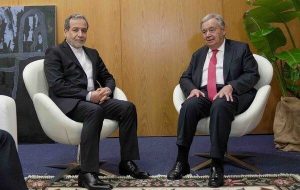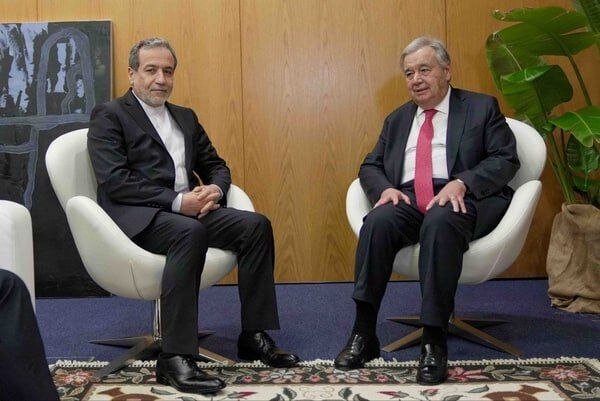Araghchi briefs UN Secretary-General on regional efforts to halt Israeli aggression
TEHRAN – Continuing his series of high-level diplomatic meetings at the 10th Global Forum of the United Nations Alliance of Civilizations (UNAOC) in Portugal, Iranian Foreign Minister Seyed Abbas Araghchi held talks with UN Secretary-General António Guterres to discuss the pressing humanitarian crises in Gaza and Lebanon. The meeting centered on critical regional and international


TEHRAN – Continuing his series of high-level diplomatic meetings at the 10th Global Forum of the United Nations Alliance of Civilizations (UNAOC) in Portugal, Iranian Foreign Minister Seyed Abbas Araghchi held talks with UN Secretary-General António Guterres to discuss the pressing humanitarian crises in Gaza and Lebanon.
The meeting centered on critical regional and international issues, particularly the dire situation unfolding in Gaza and Lebanon.
Araghchi highlighted Iran’s pivotal role in promoting dialogue among civilizations and cultures, emphasizing that constructive engagement and international cooperation are essential to addressing global challenges.
Focusing on the catastrophic humanitarian conditions in Gaza and Lebanon, Araghchi briefed Guterres on Iran’s ongoing efforts and diplomatic consultations with regional countries to halt the genocide and aggression perpetrated by the Israeli regime. He underscored the urgency of mobilizing international efforts to ensure an immediate cessation of violence, prevent further loss of civilian lives, and address the devastating humanitarian fallout.
The UN Secretary-General expressed his deep concern over the escalating violence in the region, reiterating his call for calm and the urgent need to establish a ceasefire. Guterres voiced hope that peace could soon be restored in both Gaza and Lebanon, allowing for humanitarian aid to reach those in desperate need.
Araghchi and Guterres also explored avenues for strengthening the United Nations’ role in mediating a peaceful resolution to the ongoing crises, as well as fostering broader dialogue among nations to prevent future conflicts.
Iran, Algeria aim to enhance bilateral ties
Seyed Abbas Araghchi, the Iranian Foreign Minister, also met with Ahmed Attaf, Algeria’s Foreign Minister, on the sidelines of the UNAOC Global Forum. The two leaders reviewed the status of Iran-Algeria relations and explored strategies to enhance cooperation in various fields, including trade, culture, diplomacy, and defense.
Both sides discussed the alarming situation in West Asia, focusing on the Israeli regime’s continued aggression against Lebanon and the genocide in Gaza. Araghchi thanked Algeria for its unwavering support for the Palestinian cause, particularly in the UN Security Council and the Organization of Islamic Cooperation. He proposed forming an Islamic and global coalition to counter the Israeli regime’s violations, halt arms sales to the regime, and advocate for its removal from the United Nations.
Attaf emphasized the importance of closer Algeria-Iran cooperation to address the challenges posed by Israeli expansionism. He praised the recent Islamic-Arab Summit in Riyadh, initiated by Iran, as a milestone in fostering unity within the Islamic world. Both ministers reaffirmed their commitment to deepening bilateral and multilateral collaboration.
Iranian, Tunisian FMs discuss regional unity, cooperation
In another bilateral meeting at the UNAOC Forum, Araghchi held talks with Mohamed Ali Nafti, the Tunisian Foreign Minister, to discuss ways to strengthen Iran-Tunisia relations and address regional and global challenges.
Araghchi reiterated Iran’s commitment to fostering collaboration among Islamic nations, emphasizing the importance of unity within the Organization of Islamic Cooperation (OIC) to advance the interests of Muslim communities worldwide.
Touching on the humanitarian crisis in Gaza and the escalating Israeli attacks in Lebanon, Araghchi called for swift and united action by Islamic nations to pressure Israel’s backers to end their support and compel the regime to cease its aggression. The discussions also delved into avenues for enhancing economic, cultural, and diplomatic ties between the two nations.
The meeting concluded with both sides expressing their determination to strengthen bilateral cooperation and foster greater solidarity among Islamic countries to address shared challenges.
